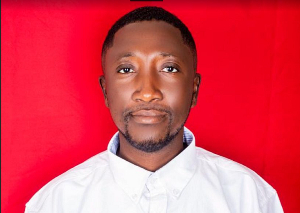- Home - News
- TWI News | TV
- Polls
- Year In Review
- News Archive
- Crime & Punishment
- Politics
- Regional
- Editorial
- Health
- Ghanaians Abroad
- Tabloid
- Africa
- Religion
- Election 2020
- Coronavirus
- News Videos | TV
- Photo Archives
- News Headlines
- Press Release
Opinions of Tuesday, 13 December 2011
Columnist: Badu, K.
Debunking cultural beliefs and marginalisation of disabled in Ghana
: Education is pivotal!
For the purposes of this article, I will define disability as: “Any physical, mental and sensory condition that restricts a person’s movements, senses or Activities”. The term disability is formally used to refer to malformations that are severe enough to interfere with, or obviate normal day-to-day living activities. According to the UN Convention on the Rights of Persons with Disabilities, “persons with disabilities include those who have substantial long-term physical, mental, intellectual or sensory impairments which, in interaction with various barriers, may hinder their full and effective participation in society on an equal basis with others”.
It is important to note that disabilities can be permanent, temporary, or episodic. They can affect people from birth, or could be acquired later in life through injury or illness. The World Health Organisation (WHO) estimates that approximately 650 million people, or 10% of the world’s population, have a disability. In Ghana, the disabled welfare groups estimate that 10% of Ghanaians have some form of physical or sensory impairment. Clearly, then, it is indefensible for society to ignore disabled people, notwithstanding the fact that, one does not become disabled volitionally or chooses to have no eyesight for instance.
In the past, and even in many communities in Ghana today, if a child is born with a deformity, it is deemed to be a result of evil spirits, a failure of the family to keep taboos, or some type of witchcraft. In some instances infanticide is ensued or the child is ostracised. The child may also be abandoned at an orphanage or sent to beg on the streets (usual abode for Ghana's disabled population). It is manifestly indefensible not to give an educable disabled child an education or training that will equip him/her with employable skills. To put it bluntly, disabled people are seen by the vast majority of Ghanaians as useless and unproductive, hence enduring harsh treatments in the society. Although constitution of Ghana in 1992, under Article 29(4) stipulates that "Disabled persons shall be protected against all exploitations; all regulations and all discriminations; abusive or degrading nature”, the framework has been ineffective. Needless to say, the Parliament of Ghana pragmatically promulgated the Disability Discrimination Act in 2006, albeit its full implementation is yet to be seen.
Despite the seemingly desperate attempts by policy makers to include disabled people in the nation building, disabled people remain marginalised, and not being accepted as integral and productive members of society. When they are shown, the focus is primordially on their impairments. In actual fact, the society obtusely views disabled people as “potential problem” or to put it euphemistically, I will say outcasts. The overarching question then is: Is it because disabled people are seen as unproductive or shiftless?
Interestingly, an erudite radio presenter from a top radio station in UK (Rainbow Radio) posed the preceding question on his informative programme. The topic under discussion was: ‘Cultural beliefs and the exclusions of the disabled in Ghana’. During the discussions, I became aware that disabled people in Ghana are not allowed in some palaces. In a nutshell, they are not allowed to come into close contact with ‘the royals’. When I heard such idiosyncratic stance, I rang spontaneously to offer my contribution to the programme. It was here that the debonair presenter quizzed whether the society views someone with impairment as shiftless and unproductive.
My response to his question was: ‘Of course, the vast majority of Ghanaians view disabled people as useless and unproductive in the society. But, the fact of the matter is disabled person has substantial long-term adverse effect on his/her ability to carry out day-to-day normal living activities, thus requires help and support in order to make any meaningful contribution within the society. Needless to say, a Ghanaian disabled does not receive any meaningful help and support within the society that will ensure his/her full participation in the nation building. Indubitably, the estimated 10% of Ghana population (disabled population) face total alienation.
“No country can afford to turn its back on 10% of its population.” –UNESCO/UNICEF, 1997. But, disappointingly, disabled people in Ghana have been facing exclusion from the nation building for far too long. Notwithstanding the fact that the Ghana constitution states: “The recognition that the most secure democracy is the one that assures the basic necessities of life for its people as a fundamental duty”. The constitution again states: “Steps will be taken to ensure the protection and promotion of all other basic human rights and freedoms, including the rights of the disabled, the aged, children and other vulnerable groups in development processes”. Nevertheless this has not always been the case in Ghana. Put succinctly, there are no meaningful welfare programmes for disabled people in Ghana.
The fact of the matter is the vast majority of Ghanaians lack empathetic qualities, in other words, they do not envisage seeing themselves in such an unfortunate situation futuristically, thus do not have empathy. I think it is about time Ghanaians emulated the altruistic attitudes of people like former president of Mexico, Vincente Fox. During general debate of the fifty-sixth session of the General Assembly (UN 2001), President Vincente Fox called upon the international community to combat poverty and social exclusion. He stated: “Societies should involve all citizens as stakeholders and that a just world must be inclusive of all groups”. For that reason Mexico proposed establishment of a "Special Committee" to study the elaboration of an international convention on promoting the rights of persons with disabilities. Their findings resulted in the United Nations Convention for the rights of persons with disabilities.
We should not lose sight of the fact that ‘disability does not mean inability’. Of course, if disabled are given the opportunity, most disabled people can contribute meaningfully to the society. Someone may not have a leg to walk; an eye to see; a hand to lift objects etc. nonetheless, might still have something to contribute to the society. In this regard, does it make sense to exclude them from the nation building?
The answer to the preceding question is no, in my opinion, because most disabled people have subtle mind or individual consciousness, and can equally contribute to the nation building with meaningful help and support. However, they are not able to contribute meaningfully because they lack the required help and support from all and sundry to do so.
In this regard, I will propound a nationwide education to highlight the issues of disability. The education should place emphasis on empathy-the attributions of one’s own feelings to a situation. In other words, if for argument sake, individuals find themselves in the ‘shoes of a disabled person’ how would individuals handle all the discriminations?
K. Badu, UK.










